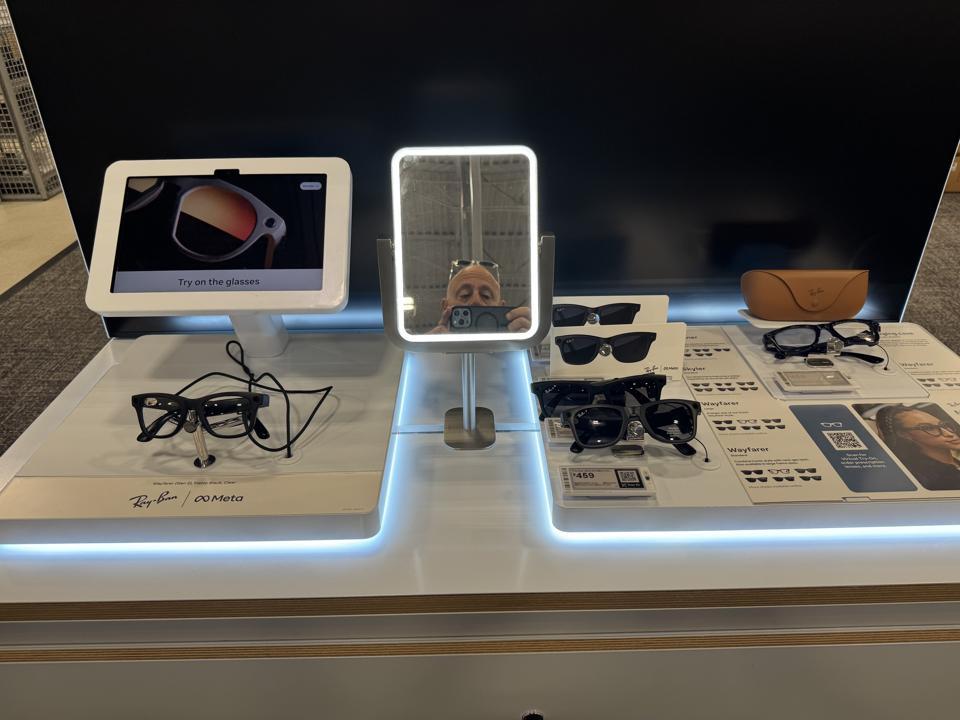Video display glasses are finally in stores where you can try them before buying. At select Best Buy locations nationwide, Viture’s new Luma Pro XR glasses are available for live demos. They project a large, high-definition virtual screen directly in front of your eyes using twin Sony micro-OLED displays. After years of online-only sales, customers can now experience extended reality in person before spending $499.
At Best Buy in Burbank, CA, the Viture demo sits by the Quest end cap in the back of the store by gaming TVs. The Quest is not available for demo, but you can pick up the Viture video display glasses and immediately have the big screen gaming experience, watch a film in 3D, or experience multi screen viewing for productivity.
Meta had a display in another part of the same Best Buy store for its Ray-Ban AI audio smartglasses. The ones without the display. They’ve garnered nothing but raves, and come in Ray-Ban Wayfarer and Oakley styles. The AI audio glasses handle calls, play music, take photos and videos, and allow access to Meta AI voice chat which can analyze and translate the photos.
The new Ray-Ban Display, announced at Meta Connect in September, adds a small right-lens screen and a gesture-based wristband called the Neural Band. It’s a very different idea than the hit audio-only model they’re selling everywhere. I found scheduling a demo for the Display glasses difficult, and booked a demo more than a month out in Meta’s new Lab store on Melrose Avenue, which isn’t even open yet.
When I visited the Ray-Ban store at Glendale, the Display glasses were locked behind glass. Staff said appointments for hands-on demos would begin in a few weeks. Meta has launched a booking site for display-glass demos at select Ray-Ban, Best Buy and Lens Crafter stores, in its Burlingame Meta Store and upcoming new LA location. Reports from Business Insider and Android Central confirm that Meta’s planning to expand its own retail operations in 2026, including new physical stores in North America and Europe.
Viture, meanwhile, is taking a more traditional retail path. The company’s display-glass demo areas at Best Buy allow anyone to plug in, put them on, and see an image floating in bright, crisp 1200p. The experience feels less like a headset and more like a personal monitor you can carry anywhere.
Viture’s Luma Pro glasses, compatible with prescription lenses, connect via USB-C to nearly any device: Nintendo Switch, Steam Deck, PlayStation, Xbox, Mac, or PC. Accessories include the $159 Mobile Dock for the Switch, the $299 Neckband for standalone playback, and an 8BitDo controller designed for XR gaming. The company calls its displays “the Clarity King,” and reviews have praised their sharpness and color fidelity.
Emily Wang, Viture’s co-founder and CMO, said the Best Buy rollout fulfills a long-standing request from customers. “People have been asking for an in-person way to try our glasses for years,” she said. “By showcasing at Best Buy, we’re making extended reality as approachable as any other consumer technology.”
The comparison between Meta and Viture highlights two different visions of smart eyewear. Meta’s Ray-Ban Display offers a lightweight, monocular heads-up screen suited for notifications, navigation, and AI assistance. Viture’s binocular video-display glasses turn any input into a full-screen experience for gaming, streaming, or productivity. Both represent the move from speculative hardware toward tangible products you can touch, test, and compare in stores.
Meta is betting on exclusivity and premium design, controlling the rollout through scheduled demos and limited inventory. Viture is betting on access, placing high-resolution display glasses directly in the hands of shoppers. Either way, the future of wearable screens has hit retail shelves. For the first time, consumers can decide which vision they prefer, one built for information, or one built for immersion, gaming and entertainment.

